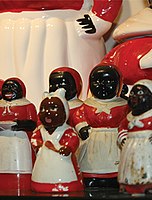User:SnowyCinema/Offensive material essay
 | This page is under construction. This user page or section is currently in the middle of an expansion or major revamping. More Information and Options However, you are welcome to assist in its construction by editing it as well. Please consult the edit history should you wish to contact the person who placed this template. If this article has not been edited in several days, please remove the under construction notice. While actively editing, consider adding {{inuse}} to reduce edit conflicts. |
Outline
[edit]- Introduction
- Neutrality principle, which transcends bigotry
- While we may host bigoted material, we also host a great collection of anti-racist material here
- General anti-censorship sentiments on Wikisource and wikis in general
- Academic usefulness of works despite the opinions they represent
- Past discussions about using a disclaimer template for works
- Varying amounts of offensive material being a complication
- Public perception of the works being a good reason to include a disclaimer notice
- Arguments for and against disclaimer templates should be put in this section (both sides have perfectly valid points that should be considered here)
- Individual contributor reputation concerns
- Being a reason to demotivate contributors from working on or maintaining this type of material
Whether we like it or not, racism is an ugly but very prevalent part of the history of most cultures. To avoid works that display or document racist ideas is to ignore significant bits of history itself, as it actually played out, in favor of an unrealistic portrayal of history that fits modern standards.
Racism is an unacceptable tenet in our society. But consider that understanding racism at its core is quintessential to
Complexity
[edit]People often like to think in strict paradigms—"this author was racist," or "this book was not racist." But the true racial ideas of a work or an author are, in reality, usually a lot more complex than that, and a more nuanced approach should be considered.
Take Al Jolson as an example. Known as the "King of Blackface" for his infamous performances, Jolson's legacy is complex. While his use of blackface was undoubtedly problematic and contributed to harmful racial stereotypes, historians note he was somewhat progressive for his era. He helped bring jazz and African-American music into the mainstream and fought for racial inclusivity in entertainment, challenging norms of his time. Thus, despite the troubling aspects of his legacy, Jolson's contributions to more positive views of African Americans are also significant. People with similarly complex legacies in terms of race include Carl Van Vechten, a writer; and Eddie Cantor, also an actor.
Moral disclaimers
[edit]It has been suggested many times at the Scriptorium to include a moral disclaimer on our works. Discussions from the early 2010s and possibly before could not gain consensus to place disclaimers on works.
Gallery
[edit]-
Al Jolson in a scene with a black actor in The Singing Fool (1928)
-
Artifacts from the Jim Crow Museum of Racist Memorabilia at Ferris State University, Big Rapids, Michigan. The mission of the Jim Crow Museum is to use objects of intolerance to teach tolerance and promote social justice.

